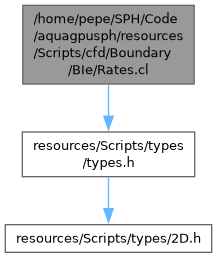Rates.cl File Reference
Pressure gradient and velocity divergence updating with the boundary integrals. More...
#include "resources/Scripts/types/types.h"
Include dependency graph for Rates.cl:

Functions | |
| __kernel void | entry (const __global int *imove, const __global float *rho, const __global float *p, const __global vec *u, const __global vec *grad_w_bi, const __global float *div_u_bi, __global vec *grad_p, __global float *div_u, usize N) |
| Pressure gradient and velocity divergence updating with the boundary integrals. | |
| __kernel void | filter_press (const __global uint *iset, const __global int *imove, __global float *p, unsigned int forces_iset, usize N) |
| Filter out other boundaries from the pressure. | |
| __kernel void | force_press (const __global int *imove, const __global vec *r, const __global vec *normal, const __global float *m, const __global float *p, __global vec *force_p, __global vec4 *moment_p, vec forces_r, usize N) |
| Compute the force and torque at the boundary. | |
Detailed Description
Pressure gradient and velocity divergence updating with the boundary integrals.
Function Documentation
◆ entry()
| __kernel void entry | ( | const __global int * | imove, |
| const __global float * | rho, | ||
| const __global float * | p, | ||
| const __global vec * | u, | ||
| const __global vec * | grad_w_bi, | ||
| const __global float * | div_u_bi, | ||
| __global vec * | grad_p, | ||
| __global float * | div_u, | ||
| usize | N ) |
Pressure gradient and velocity divergence updating with the boundary integrals.
- Parameters
-
imove Moving flags. - imove > 0 for regular fluid particles.
- imove = 0 for sensors.
- imove < 0 for boundary elements/particles.
rho Density \( \rho_{n+1} \). p Pressure \( p \). u Velocity \( \mathbf{u} \). grad_w_bi Gradient of constant fields due to the boundary integral \( \langle \nabla 1 \rangle^{\partial \Omega} \). div_u Velocity divergence \( \nabla \cdot \mathbf{u} \). Actually this is just the part that has to do with the boundary element velocity grad_p Pressure gradient \( \frac{\nabla p}{rho} \). div_u Velocity divergence \( \rho \nabla \cdot \mathbf{u} \). N Number of particles.
◆ filter_press()
| __kernel void filter_press | ( | const __global uint * | iset, |
| const __global int * | imove, | ||
| __global float * | p, | ||
| unsigned int | forces_iset, | ||
| usize | N ) |
Filter out other boundaries from the pressure.
This is used to compute the force on an specific iset
- Parameters
-
iset Particle set imove Moving flags. - imove > 0 for regular fluid particles.
- imove = 0 for sensors.
- imove < 0 for boundary elements/particles.
p Pressure of the boundary element \( p \). forces_iset Particles set of interest. N Number of particles.
◆ force_press()
| __kernel void force_press | ( | const __global int * | imove, |
| const __global vec * | r, | ||
| const __global vec * | normal, | ||
| const __global float * | m, | ||
| const __global float * | p, | ||
| __global vec * | force_p, | ||
| __global vec4 * | moment_p, | ||
| vec | forces_r, | ||
| usize | N ) |
Compute the force and torque at the boundary.
- Parameters
-
imove Moving flags. - imove > 0 for regular fluid particles.
- imove = 0 for sensors.
- imove < 0 for boundary elements/particles.
r Position \( \mathbf{r} \). normal Normal \( \mathbf{n} \). m Area of the boundary element \( s \). p Pressure of the boundary element \( p \). force_p Pressure force on the boundary element moment_p Pressure moment on the boundary element forces_r Point with respect the moments are computed \( \mathbf{r}_0 \). N Number of particles.
Generated by